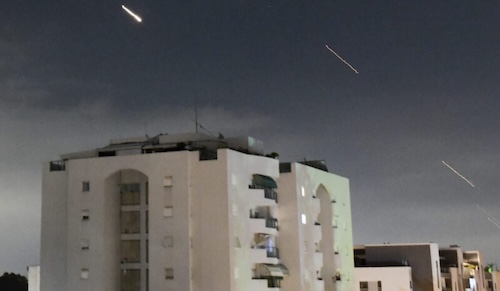
After celebrating the amazing success in overcoming the Iranian terrorist attack, the time has come for a provisional summation. Let us then begin with the huge miracles that accompanied it, where — aside from one victim, a Bedouin girl who got hurt from shrapnel — there were no casualties whatsoever. No one denies that the impressive success surprised even the greatest experts who fully admit that the number of successful interceptions is way beyond any known statistics. That having been said, let us analyze the victory and break it down to its components.
Iran sent 185 drones, each of which takes some six hours to reach its destination. After they were detected, there was plenty of time to intercept them. Israel was not the only one to do so. The U.S., Britain, France and even Jordan joined the fray. It is no easy feat to shoot down such a small aircraft but the protective aerial systems have already learned how to deal with such craft and indeed, succeeded in shooting them down, which is not so surprising, taking into account the lack of the element of surprise in the attack.
Then there were thirty-six cruise missiles shot down, not a large number considering that these also take time to reach their destination and that the coalition countries also possess defense systems, so that their shooting down is not really surprising.
There remain 110 ballistic missiles which also take time to get here from Iran, but much less than the others. Contrary to the others, these missiles fly high in the atmosphere before landing. Some of these were destroyed up in the air, yet some of them did succeed in evading all defense systems and landing on the air base in Nevatim.
These are not target-aimed missiles, as opposed to the drones, and the fact that they did not damage anything in landing is definitely due to Heavenly intervention and not at all connected to defense systems. The fact that with all prior information and prior preparation, the Iranians did succeed in penetrating the defensive umbrella aerial systems and inflict some damage on a strategic site should cause concern to top army officials, more than the other successes since this time, we are 'only' talking about 110 rockets aimed mostly at one target in the middle of the desert.
But what will happen if the Iranians decide to release hundreds of such missiles, aimed at inhabited sites in close succession and the defense systems fail to knock down even only a few of them?
How Much Did It Cost?
To be sure, there is no price tag on lives, but by the same token, were it not for the successful interceptions, the damage would have cost Israel a tremendous deficit to its national coffers. So let us not forget that the successful interceptions also cost a huge amount of money. Estimations have it that a night such as was experienced where hundreds of missiles were shot down cost the country some five billion shekel — about $1.5 billion. No mistake here. An astronomical sum which includes the intercepting aircraft, each of which costs tens of thousands of dollars. The government will have to pay for the hovering in the air of dozens of their aircraft for many long hours.
The sum of five billion shekel, represents the total of the budget for the yeshiva world for ten years! If government economists 'celebrated' the hold-up of yeshiva student budgets and claimed that the government 'saved' an annual expense of half a billion shekel, they will now have to pay the cost of one night's action which runs to ten times the so-called 'savings' or gain.
Chazal said (Kesuvos 66b) on the verse, 'Salting money is through loss,' where Rashi comments: 'Whoever seeks to preserve his money by salting it [as it were], shall diminish any loss by continually giving tzedokoh to his utmost, for that is its preservation."
The converse holds true as well: whoever maintains that withholding money from Torah scholars will benefit the country coffers, will discover that the savings will end up costing him a thousand times as much for each imagined benefit. The Torah world will find a source for its budgetary needs but the government will end up being a bottomless pit.
Iranian missiles





